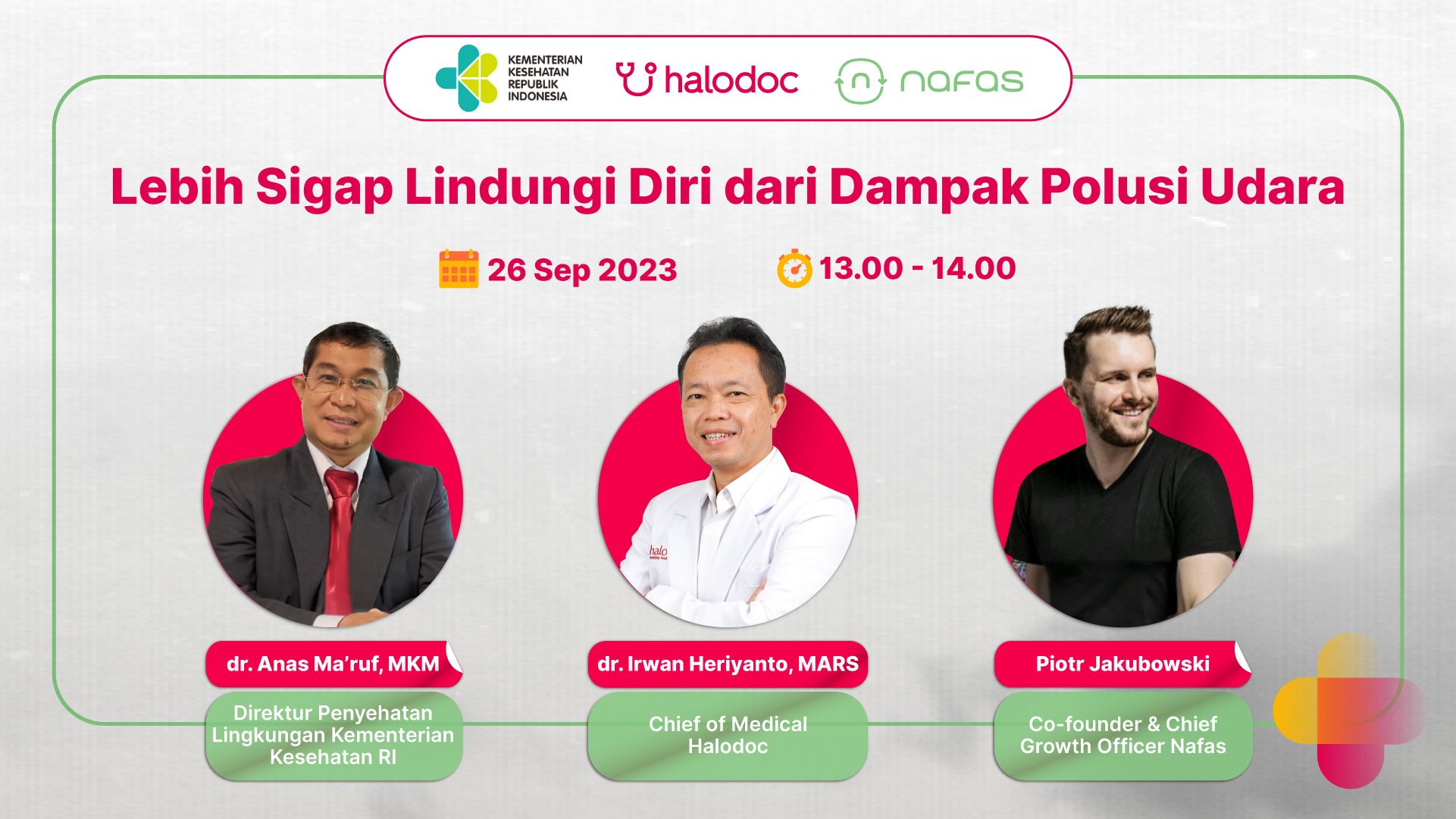Halodoc and Nafas Fight Against Pollution

Last week, in a bid to raise public awareness and preparedness against the harmful effects of air pollution on health, Artemis Indonesia supported Nafas, a digital air quality monitoring platform, partnered with Halodoc, a digital healthcare ecosystem, to present its latest report on the consequences of air pollution on public health. This collaboration serves as a crucial step for both parties, given the pressing concern surrounding air quality that has captured substantial public attention.
The joint study conducted by Nafas and Halodoc between June and August 2023 uncovered a significant finding: a 10 μg/m3 increase in PM2.5 air pollution led to a 34% surge in respiratory disease cases. Alongside various findings related to the relevance of air pollution and respiratory diseases, the report provides education on the impact of PM2.5 pollution and offers recommendations and expert guidance on maintaining health amid air pollution.
Air pollution has been a growing concern in recent years, but it gained significant attention in mid-2023 as conditions often deteriorated, raising concerns about its health effects. Complaints related to respiratory issues such as coughing, congestion, and fever became more frequent in areas with poor air quality over the past few months. Currently, air pollution conditions in several regions of Indonesia, especially Jabodetabek, remain uncertain and are characterized by poor air quality.
Nafas and Halodoc share the belief that air quality is a collective responsibility, given its significant impact on both short-term and long-term health. In this regard, their collaboration aims to support the community in coping with health risks resulting from ever-changing air conditions.
Here are the five key findings from the Nafas and Halodoc study conducted between June and August 2023:
- A 34% increase in respiratory complaints on Halodoc was observed in June when PM2.5 pollution increased by 10 μg/m3.
- As pollution levels rose, the percentage of respiratory complaints in each district of Jabodetabek increased, reaching up to 41%.
- Higher occurrences of high pollution events (PM2.5 exceeding 55 μg/m³) were associated with a potential increase in respiratory complaints within 12 hours.
- Complaints related to sinusitis and asthma surfaced the fastest (within 3-48 hours), while asthma and bronchitis complaints saw the highest increase in cases (fivefold).
- The highest increase in respiratory disease cases was observed in sensitive age groups, with a 48% increase among those over 55 and a 32% increase among those aged 0-17 years.
As a digital healthcare ecosystem, Halodoc is committed to promoting the health of the Indonesian population, especially amid the current air quality conditions. Dr. Irwan Heriyanto, MARS, Chief of Medical Halodoc, emphasized the importance of telemedicine services like Halodoc in the early detection of respiratory symptoms and the shift towards preventive health measures. This aligns with the direction set by the Ministry of Health of Indonesia to encourage greater public awareness of health conditions and prompt consultation with doctors in the face of current air quality conditions.
The joint report by Nafas and Halodoc also shares several tips for maintaining health amidst air pollution, including:
- Regularly monitor air quality using the Nafas app.
- Stay indoors during periods of high pollution.
- Use masks when venturing outdoors if necessary.
- Maintain a balanced vitamin intake and exercise regularly to boost immunity.
- Consult with Halodoc if you experience respiratory symptoms.
Nafas emphasizes the need for more local studies to provide relevant findings concerning PM2.5 pollution and its connection to respiratory diseases in Jabodetabek. Piotr Jakubowski, Co-founder, and chief Growth Officer of Nafas, expressed pride in collaborating with Halodoc to present data on air pollution and its association with respiratory diseases, with the hope that it will enhance public understanding of the health risks posed by air pollution, not only in the long term but also in the short term.
Dr. Anas Ma’ruf, MKM, Director of Environmental Health at the Ministry of Health of Indonesia, appreciated the efforts of Halodoc and Nafas in addressing air pollution as a digital platform. He urged the public to adhere to health protocols, such as wearing medical masks and promptly seeking medical attention for respiratory issues. He also encouraged the use of teleconsultation services to detect health effects caused by air pollution. Together, he emphasized the need for collective action to protect both individuals and the environment from pollution, starting from small-scale initiatives such as reducing fossil fuel vehicle use and avoiding activities like open burning.
It's important to note that this report is based on a limited study, combining data from Nafas on sensor locations in 73 districts in Jabodetabek and information collected by Halodoc between June and August 2023. The information provided in this study is for educational and informational purposes only. For more information on the findings of the Nafas and Halodoc report on air pollution conditions, the public can download the report at bit.ly/StudiNafasHalodoc.